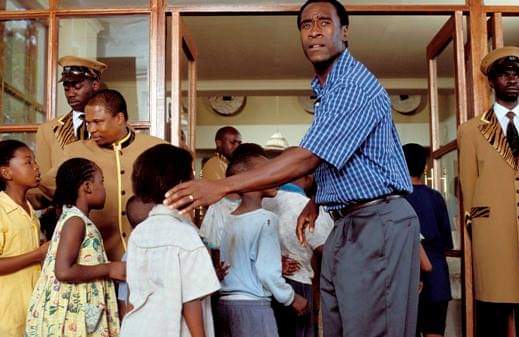
WASHINGTON/KIGALI, March 24 (Reuters) – Paul Rusesabagina, who was portrayed as a hero in the film “Hotel Rwanda,” was released from a Rwandan prison on Friday, U.S. officials said, after his sentence was commuted following intense diplomacy by the United States.
Rusesabagina, a U.S. permanent resident, was accompanied by a U.S. embassy official as he was moved from prison to the residence of Qatar’s ambassador in Kigali late on Friday, according to two senior Biden administration officials who briefed reporters in Washington.
Rusesabagina was sentenced in September 2021 to 25 years over his ties to a group opposed to Rwandan President Paul Kagame that has an armed wing.
The Rwandan government announced earlier on Friday it was commuting Rusesabagina’s sentence.
U.S. President Joe Biden issued a statement welcoming Rusesabagina’s release and thanking the governments of Rwanda and Qatar for making it possible.
Rusesabagina will remain in Rwanda for a couple of days before travelling to Doha and then to the United States, the officials said.
“There was no particular concession made by us as the government here,” said one of the U.S. officials, speaking on condition of anonymity. “I think of this one much more as a sequence of steps that were worked out involving the Rwandan government, U.S. government and of course Paul himself.”
Washington’s historically close ties with Rwanda have been strained by the case and by U.S. allegations, denied by Kigali, that Rwanda has sent troops into neighbouring Democratic Republic of Congo and supports rebels there.
Stephanie Nyombayire, spokesperson for Rwandan President Paul Kagame, tweeted that the release was “the result of a shared desire to reset US-Rwanda relationship”.
BOYCOTTED TRIAL
Rusesabagina, 68, was sentenced in September 2021. He denied the charges and boycotted the trial, which he and his supporters called a political sham.
He also said he had been kidnapped from Dubai in 2019 and returned to Rwanda by force. Kagame denied any abduction, but suggested Rusesabagina had been tricked in Dubai into boarding a plane to Rwanda.
Washington designated him as “wrongly detained”, partly because of what it called a lack of guarantees of a fair trial.
U.S. Secretary of State Antony Blinken met Kagame during a visit to Kigali in August and “spoke a great deal about the road map to Paul’s eventual release,” said a U.S. official familiar with the matter, adding that the intervention helped secure the early release.
A U.S. congressional aide familiar with the negotiations, who declined to be named, noted that the case had resonance far beyond Africa, adding: “I think it became clear to the Rwandans that this irritant was not going to go away.”
“Hotel Rwanda” portrays Rusesabagina’s success in saving more than 1,000 refugees, including his family, during the genocide in 1994 by sheltering them in the besieged hotel that he managed in Kigali.
RUSESABAGINA REGRETS
Rusesabagina, a vocal critic of Kagame, acknowledged having a leadership role in an opposition group, the Rwanda Movement for Democratic Change (MRCD), but denied responsibility for attacks carried out in Rwanda by its armed wing, the Forces for National Liberation (FLN).
The trial judges said the two wings of the group were indistinguishable.
In a letter to Kagame, dated Oct. 14 and released on Friday by the Justice Ministry, Rusesabagina wrote: “I regret not taking more care to ensure that members of the MRCD coalition fully adhered to the principles of non-violence.”
He wrote that if he was pardoned and freed, he would spend the rest of his days in the United States, “in quiet reflection”.
Nineteen others had sentences that were likewise commuted and are expected to be released, government spokesperson Yolande Makolo said. Makolo said the underlying conviction remained in force; the Justice Ministry said this meant those whose terms had been commuted were in effect being released on licence.
